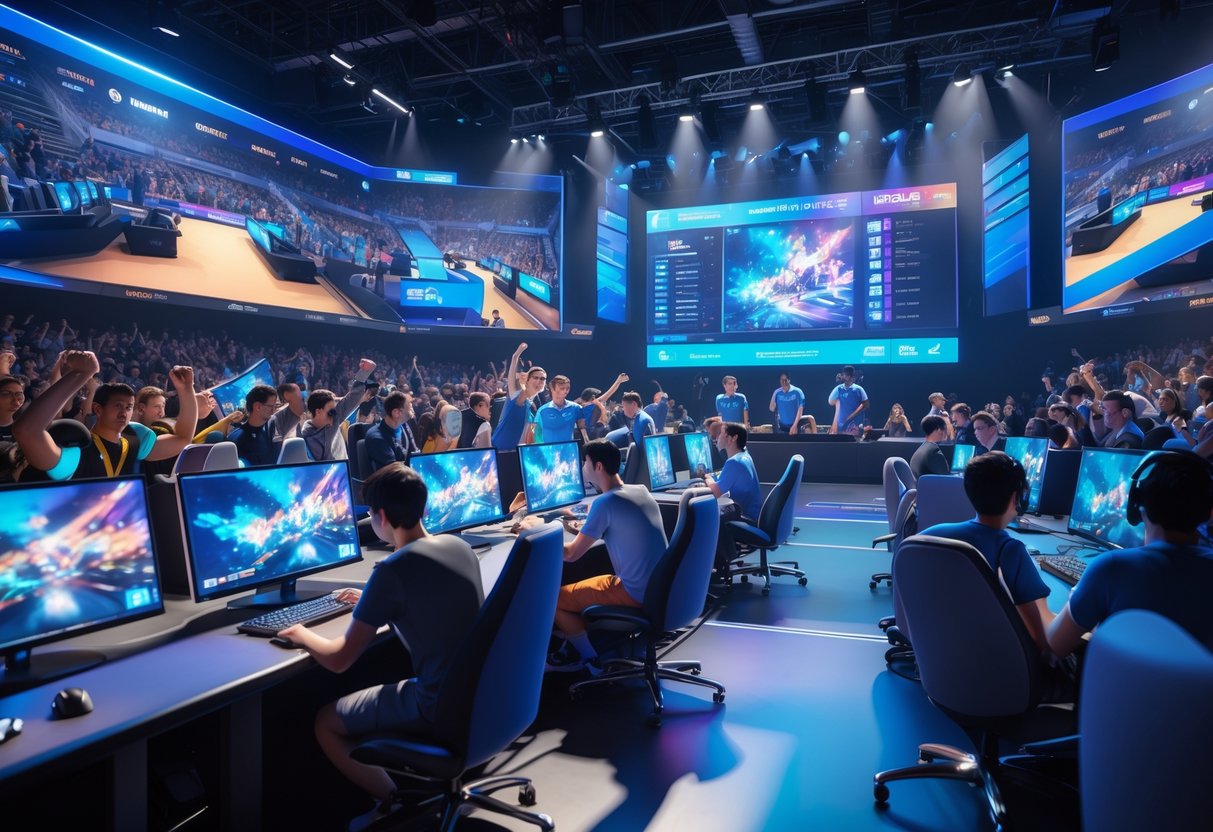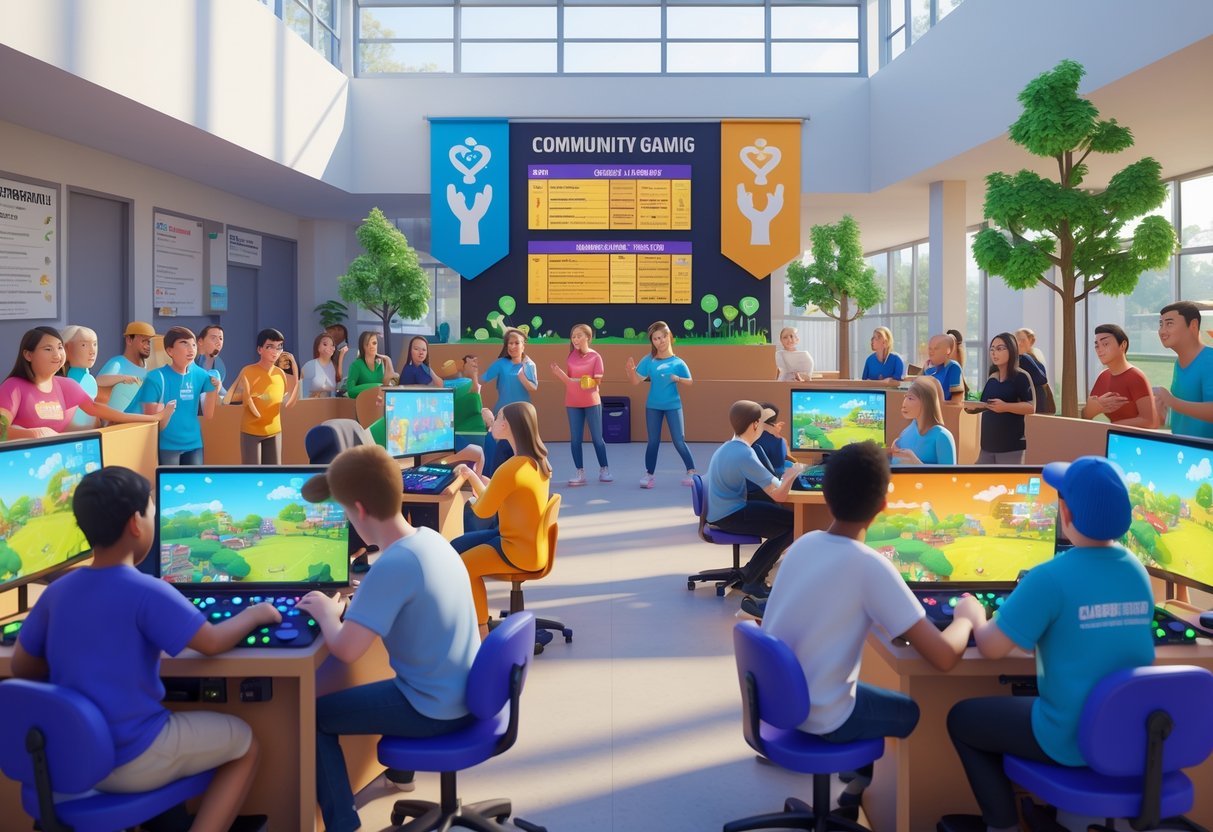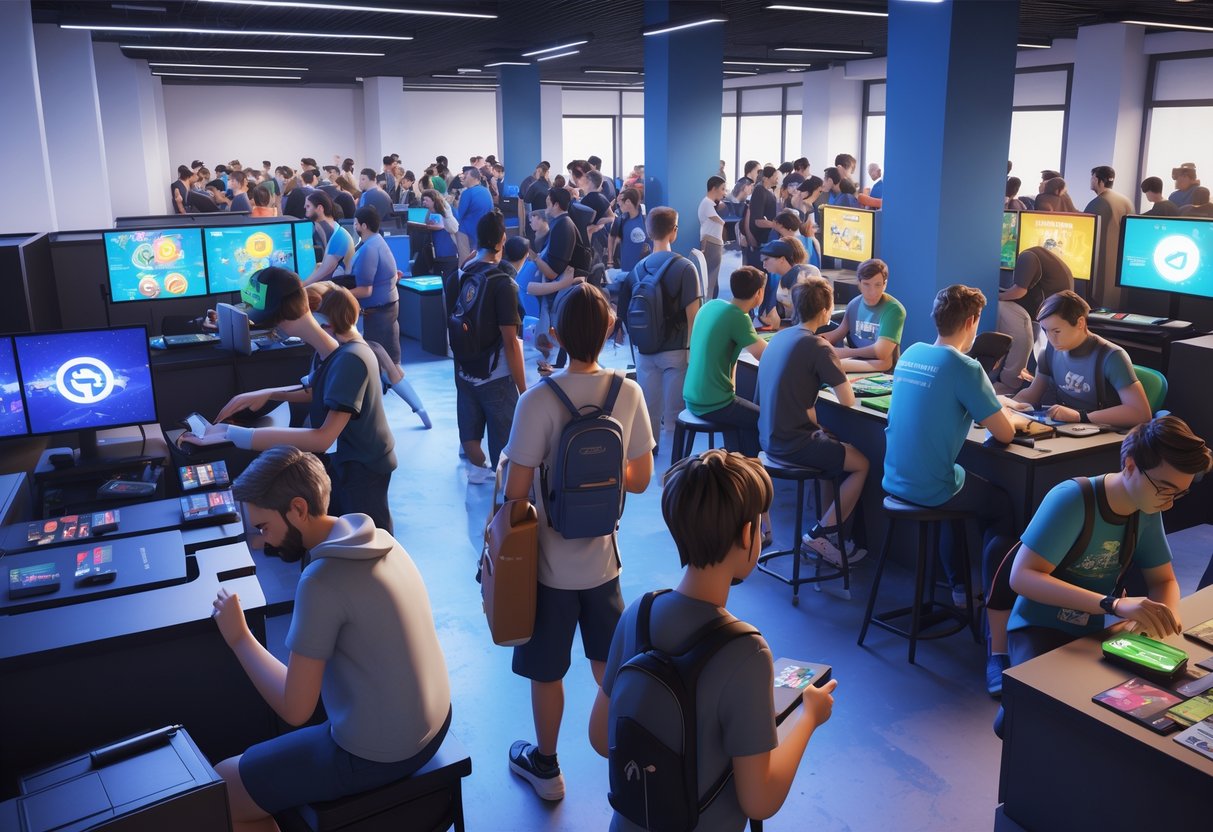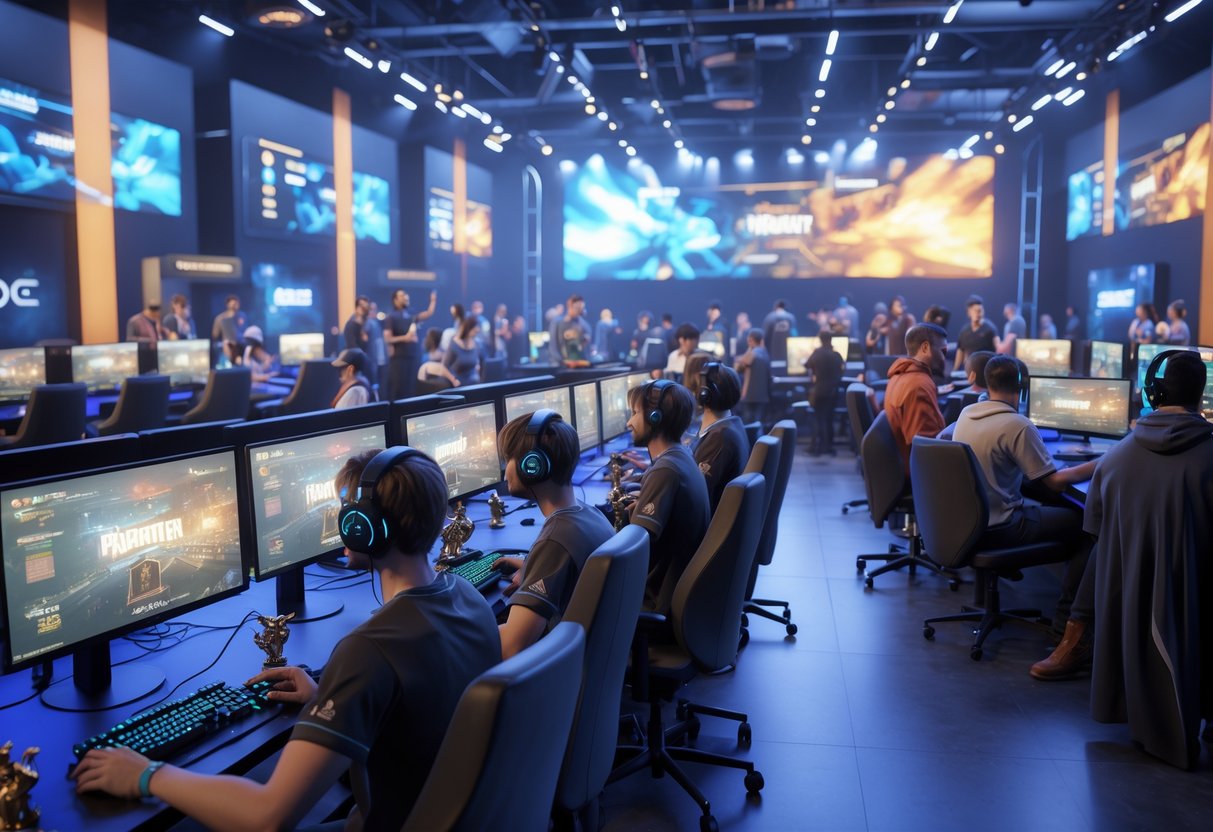Community Tournaments Value: Key Benefits, Impact, and Organisation
Updated On: October 24, 2025 by Aaron Connolly
Core Value of Community Tournaments
Community tournaments really bring people together through friendly competition and teamwork. They strengthen local ties, open up economic opportunities, and help folks form connections that last way past the final whistle.
The Role of Community Tournaments in Local Life
Community tournaments turn neighbourhoods into lively gathering spots. They pull together people who might never cross paths otherwise, building bridges between different ages, backgrounds, and skill levels.
You’ll see real friendships form over tense matches and unforgettable moments. Players and spectators share stories about dramatic wins and tough losses, weaving them into the local lore.
People pick up new skills just by joining in. Seasoned players show newcomers the ropes, sharing tips and tricks that lift everyone up.
These tournaments give some structure to community life. Regular events create anticipation and give people something to look forward to throughout the year.
The thrill of competition pushes folks to improve. Representing your local area adds pride, and people tend to step up their game, raising the overall skill level in the community.
Types of Community Tournaments
You’ll find all sorts of community tournaments, each catering to different interests and age groups.
Sports tournaments are still the go-to choice, with everything from football leagues to volleyball matches. They’re easy to set up and draw in participants of all ages.
Gaming and esports tournaments are catching on fast. Local gaming centres and halls host competitions for popular games, bringing younger crowds into the mix.
Academic tournaments—like quiz nights or debates—get the brainy types involved. They make learning fun and keep the competitive energy high.
Creative contests, whether it’s art, cooking, or music, let people show off talents outside of sports. These events draw in folks who might not be interested in running or jumping around.
Some tournaments pair up people of different ages on purpose. These multi-generational events break down age barriers and create cool opportunities for mentoring.
Community Tournaments and Local Communities
The bond between community tournaments and local areas sparks positive changes that linger long after the event.
Local businesses get a direct boost. Tournaments bring in visitors who spend money at shops, restaurants, and even hotels.
Volunteer roles multiply during tournament time. Residents pitch in as referees, scorekeepers, organisers, and more, building stronger community ties in the process.
Communities take pride in hosting great tournaments. It strengthens local identity and encourages more people to get involved.
Young people get a lot out of these events. They learn teamwork, build leadership skills, and gain confidence in a supportive setting.
The connections don’t just stop when the tournament ends. Friendships, business partnerships, and new community projects often grow out of these events.
Community Engagement and Social Cohesion
Sports tournaments bring neighbours together and help break down the walls that sometimes divide us. They give people shared goals and experiences, no matter where they come from.
Fostering Community Engagement
Community tournaments get people off the sidelines and into the action. Residents jump in as players, volunteers, or just to watch.
Local football leagues and basketball tournaments bring families outside. Parents cheer, kids play, and everyone finds a way to get involved.
Volunteer opportunities pop up naturally:
- Match officials and scorekeepers
- Food stall operators
- Equipment managers
- Event photographers
The Hoops for Hope basketball tournament really shows how it works. Local businesses sponsored teams, and residents volunteered in all sorts of roles. People made connections they never would have otherwise.
A lot of tournaments now use online tools for sign-ups and updates. Social media groups keep conversations going, so the community stays connected even after the games end.
Promoting Social Cohesion Through Sport
Sport has a way of breaking down social barriers that few other things can match. When people play together, teamwork and fair play matter more than anyone’s background.
Mixed-age tournaments help different generations bond. Teenagers play alongside adults, learning respect and picking up mentors. The annual Bunbury Cricket Club Easter Match has done this for over a century.
Local businesses often sponsor teams or help out. This creates a web of support that goes beyond the tournament itself.
Sometimes, tournaments even help heal divisions. When the Ivory Coast qualified for the 2006 World Cup, it brought the country together during a tough time. On a smaller scale, local tournaments can do the same for neighbourhoods.
Traditions grow around these events. Families come back year after year, building memories that last.
Diversity and Inclusion in Community Tournaments
Modern tournaments make a real effort to welcome everyone. That kind of inclusivity makes events stronger and more meaningful.
The Special Olympics is a great example. Athletes with intellectual disabilities compete alongside others, focusing on abilities instead of limitations. More local tournaments are following this approach.
You’ll see cultural exchange at international or multicultural events. The FIFA World Cup does it on a huge scale, but local tournaments do their own version—sharing food, music, and traditions.
Organisers often offer fee waivers and scholarships so nobody gets left out because of money. Equipment lending programs help too.
Tournaments now include different skill divisions, so beginners and experienced players both feel welcome. Women’s and girls’ divisions have grown a lot lately, giving more people a chance to play.
Economic Impact on Local Economies
Community tournaments bring real financial benefits to the places that host them. They generate spending, create jobs, and draw in visitors who support local businesses.
Direct Economic Contributions
Players and fans spend money on all sorts of things during tournaments. Hotels fill up as teams need places to stay. Restaurants get busy with hungry families and athletes.
Shops see more customers buying snacks, drinks, and even gaming gear. Petrol stations and transport services also get a bump in business.
People usually spend on:
- Accommodation
- Food and drinks
- Fuel and transport
- Retail and souvenirs
- Entertainment
A single big tournament can bring in as much as £1.6 million in local spending. For many small businesses, these weekends are the busiest of the year.
Job Creation and Income Generation
Tournaments create jobs, even if just for a short time. Organisers hire local workers for setup, registration, and crowd control. Security teams work longer hours during events.
Referees and officials get paid for their expertise. Local photographers and videographers cover the action. Catering staff serve more people than usual.
Common tournament jobs:
- Event staff
- Security
- Tech support
- Catering and hospitality
- Marketing and media
Young people pick up valuable work experience. Some even discover careers in event management or esports. The skills they learn carry over into other jobs too.
Boosting Local Economies Through Tournaments
Tournaments attract teams and families from outside the area. Many arrive early for practice or stay longer to explore local sights.
Hotels see higher occupancy during tournament seasons. Tourist attractions get more visitors as families make a weekend out of it.
When a city gets known for hosting great events, it attracts more tournaments in the future. This keeps the economic benefits rolling in as venues become regular stops on the tournament circuit.
Quick tip: If you run a business, reach out to local esports tournament organisers to see how you can get involved or benefit from upcoming events.
Tourism and Accommodations

Community tournaments drive demand for local lodging and pull in visitors from outside the city. These events fill hotel rooms during times that might otherwise be slow.
Drawing Visitors Through Sports Events
Sports tournaments attract visitors who need places to stay and things to do. Just one major tournament can bring £1.6 million in spending to the area.
Visitors don’t just come for the games. They book hotels, eat out, and shop locally. For example, the Rugby World Cup in Japan created about 25,000 jobs across different industries.
Tournament visitors usually spend on:
- Hotels
- Meals
- Shopping and souvenirs
- Entertainment
The same pattern pops up in different sports. Youth tournaments often mean families book several nights. Adult leagues bring in teams from nearby cities who stay for the weekend.
Accommodations and Hospitality in Tournament Hosting
Hotels and B&Bs see the biggest boost when tournaments last more than a day. Weekend events mean higher demand, and accommodation providers can charge a bit more.
Smart hosts team up with hotels to offer tournament packages. These might cover breakfast, parking, or shuttle rides to the venue. Some even offer group discounts for teams.
Things to consider for accommodation:
- Enough rooms for everyone
- Smart pricing
- Package deals with perks
- Easy transport between hotels and venues
The hospitality sector really benefits during multi-day tournaments. Teams sometimes book entire hotel floors. Parents and supporters look for family-friendly options at fair prices.
Camping sites and alternative accommodations also see more guests. Budget-minded visitors want affordable, convenient places to stay.
Organising a Community Tournament
Running a community tournament takes clear leadership, careful planning, and lots of local involvement. The organiser juggles many tasks to make sure the event brings people together and leaves a positive mark.
Key Responsibilities of the Tournament Organiser
The organiser acts as the main coordinator for everything. We handle everything from the first meeting to the final cleanup.
Admin tasks keep things on track. We secure permits, manage sign-ups, and handle the money. We track participants, collect fees, and keep records straight.
Teamwork matters. We work with volunteers, referees, and local officials. Good communication helps everyone know their job.
Risk management keeps people safe. We look for possible problems, set up insurance, and plan for emergencies. That includes weather and medical support.
We also build relationships with stakeholders. We connect with local councils, sports clubs, and community groups. These partnerships offer resources, venues, and help with promotion.
Planning and Logistics Essentials
Picking a venue is a big deal. We need enough space for everyone, plus the right facilities. Parking, accessibility, and storage all matter.
Budgeting means estimating every cost. Venue rental, equipment, insurance, and marketing all add up. Always plan for surprises by setting aside a little extra—around 10-15% of your budget.
Gathering supplies should happen early. Make a list of everything needed, from balls and nets to first aid kits and sign-in sheets. It’s smart to have backups for important gear.
Scheduling keeps things running smoothly. Build a realistic timeline for setup, matches, and cleanup. Leave buffer time between games to handle any delays.
Registration systems help us keep track of who’s playing. Online forms work well, but paper sign-ups are fine if that’s what people prefer.
Involving Local Communities in Organisation
Volunteer recruitment pulls people together and slashes costs. Let’s reach out to local sports clubs, schools, and community organisations.
Clear role descriptions let volunteers know what they’re signing up for and how much time they’ll need to give.
Local business partnerships give both sides a boost. Local businesses can sponsor events, donate prizes, or pitch in with services in exchange for some promotion.
These partnerships build win-win relationships and set the stage for future tournaments.
Community outreach gets more people involved. We can spread the word through local newspapers, social media groups, and community notice boards.
School networks and youth organisations help us reach families with young players.
Feedback collection helps us make the next event better. Let’s ask participants, volunteers, and spectators what they thought—during and after the tournament.
Quick surveys or even casual chats often reveal what worked and what needs a rethink.
Youth involvement keeps the community engaged for the long haul. Training young people as assistant organisers or junior volunteers builds local skills and grows future leaders.
Entry Fees and Funding Models

Most local community tournaments charge entry fees between £10 and £50 per team. The most successful events mix revenue from sponsorships, grants, and merchandise sales to keep things running smoothly.
Understanding Entry Fees
Picking the right entry fee is always a balancing act—covering costs, but keeping it affordable. Most organisers start by adding up venue hire, equipment, insurance, and prizes, then dividing by how many participants they expect.
It’s smart to check out similar events nearby. Local five-a-side football tournaments usually charge £40-60 per team, and gaming competitions often ask £15-25 per player.
Think about the value you’re offering. If you’ve got great facilities, professional referees, or guaranteed prizes, you can justify a higher fee.
If it’s more of a basic community event, keep costs down so more folks can join in.
Quick win: Try pricing your entry fee 10-20% below other local tournaments to attract newcomers, while still covering your costs.
Most community tournaments seem to land in the £25-35 per team range. That covers the basics without scaring off families.
Funding and Sponsorship Approaches
Local sponsorships usually work better than chasing big brands. Corner shops, pubs, and family-run businesses often chip in £50-200 for a banner or a mention in the programme.
Three sponsorship tiers that work:
- Bronze (£50): Logo on programmes
- Silver (£150): Banners at the venue
- Gold (£300): Tournament naming rights
Community grants can help too. Sports England, local councils, and charities sometimes offer £500-2,000 grants for youth sports.
Heads up: Grant applications can take 6-8 weeks to process, so start early and have a backup plan.
You can also make extra money with merchandise, food stalls, and raffles. These often bring in another £200-500 and add to the event atmosphere.
Prize Structures and Merchandise

Community tournaments usually rely on two main ways to bring in money: smart prize pools that keep players motivated without breaking the bank, and merchandise sales that help your event stick in people’s minds.
Prize Pools and Awards
Most community tournaments have tight budgets. We suggest putting about 60-80% of entry fees into the prize pool and using the rest for running costs.
Cash vs Non-Cash Prizes Cash prizes attract serious competitors. Still, merchandise, gaming gear, or store credit can sometimes get more people excited at a local level.
Many tournaments mix both for the best results.
Distribution Models
- Winner-takes-most: 50% to first, 30% to second, 20% to third
- Balanced spread: Split more evenly across the top 8-16 finishers
- Participation rewards: Small prizes for everyone, bigger rewards for the top spots
Entry fees for local events usually sit between £5 and £25. A 32-player tournament at £10 each brings in £320, which lets you set aside £200 for prizes and use £120 for venue and gear.
Quick win: Try tiered entry fees. Offer a “casual bracket” at £5 and a “competitive bracket” at £15 to attract all types of players and boost turnout.
Merchandise Sales and Branding
Merchandise does double duty at community tournaments. It brings in extra cash and gives people something to remember your event by.
Popular options include branded t-shirts, hoodies, gaming mousepads, and custom keycaps. Try pricing items at two or three times what they cost to make.
Pre-Order Strategy Take pre-orders when people register. That way, you don’t get stuck with unsold stock and you know exactly what to order.
Bundle deals work too—like “entry + t-shirt” for £5 extra.
Digital Merchandise Look at digital items like Discord badges, custom Steam art, or in-game cosmetics. These cost nothing to produce and younger players love them.
Branding Opportunities Team up with local gaming cafés or tech shops. They might sell you merchandise at wholesale prices in exchange for some event promotion. This keeps your upfront costs low and builds good relationships.
A tip: Don’t order a ton of merch unless you know people want it. Start small—stickers or badges—before you risk money on pricier gear.
Code of Conduct and Ethical Guidelines

Strong guidelines make tournaments safer and keep things fair. Clear rules protect everyone and build trust in your event.
Establishing a Code of Conduct
We suggest putting together a simple code of conduct before the tournament starts. Spell out what’s okay, what’s not, and what happens if someone breaks the rules.
Start with basics—players should treat each other, organisers, and spectators with respect. Lay out rules against harassment, discrimination, and bad sportsmanship.
Key code of conduct points:
- No offensive language in chat or voice
- Respect for all, no matter their skill level
- No cheating or exploiting game bugs
- Guidelines for streaming and social media use
- Clear ways to report rule-breaking
Spell out consequences. A first offence might get a warning, but serious stuff could mean instant disqualification. Post the rules on registration pages and mention them at the opening.
Appoint moderators to keep an eye on behaviour during matches. This lets you handle issues fast before they get out of hand.
Ensuring Fair Play and Safety
Tournament integrity depends on enforcing rules and keeping players safe. We focus on stopping cheating and making sure everyone feels secure.
Use anti-cheat tools that fit your game and format. Online events need software checks, while in-person tournaments should include equipment inspections.
Tell everyone which programs are banned and how you’ll spot rule-breakers.
Fair play tools:
- Screen recordings for online matches
- Referees for key games
- Time limits for tech issues
- Standard gear rules for LAN events
- Appeals process for disputes
Protect player privacy and safety. Only collect what you really need and keep it secure. For youth events, get parental consent and maybe add more supervision.
Set up easy ways for players to report bad behaviour. Offer several contact options so people feel comfortable speaking up. Respond quickly and keep records for future reference.
Case Studies of Major Tournaments

Big tournaments like the FIFA World Cup and Super Bowl show how sporting events can shake up whole communities. They bring in millions of visitors and leave lasting marks on local businesses and infrastructure.
Community Impact of the FIFA World Cup
The FIFA World Cup changes things in a big way for host countries. Cities invest billions in new stadiums and transport links, creating thousands of jobs during the build.
Local communities feel the impact right away. Hotels fill up for weeks, and restaurants scramble to keep up with all the customers.
Small businesses often see their revenue jump by 200-300% during matches.
The World Cup shines a global spotlight on host cities. Tourism often stays higher for years after the event, with many visitors coming back later.
But there are downsides too. Housing costs can rise as homes turn into short-term rentals, and some locals feel squeezed out of their own neighbourhoods.
Economic and Social Effects of the Super Bowl
The Super Bowl pumps hundreds of millions into host cities. One event can bring over $300 million in visitor spending in just a week.
Hotel prices triple during Super Bowl week. Restaurants get booked solid. Even shops far from the stadium see more business as visitors explore the area.
The event creates temporary jobs in security, transport, and event staffing. Local media coverage also puts the city on the map for future tourists.
Host cities often invest a lot in infrastructure improvements. New transport and upgraded venues keep helping locals long after the game is over.
Hosting brings more than just money. Communities feel proud to host such a huge event, and local volunteers get valuable experience working with visitors from all over.
Long-Term Benefits and Community Legacy

A well-run community tournament leaves a mark that lasts way past game day. These events build connections and traditions that keep local gaming scenes alive for years.
Sustaining Community Tournaments Over Time
The best community tournaments become yearly highlights that players look forward to. We’ve seen this happen again and again in UK gaming scenes.
Building sustainable tournaments takes steady funding and solid venue deals. Most organisers start with entry fees and local sponsors, then pull in bigger sponsors as their reputation grows.
Key ways to stay sustainable:
- Secure multi-year venue deals
- Partner with gaming cafés or universities
- Build volunteer teams that come back each year
- Keep good relationships with equipment sponsors
The financial side really matters. Tournaments that put prize money and sponsor funds back into better gear and venues tend to grow. Those that just pull out profits rarely last more than a few years.
Stay in touch with players between events. Discord servers, social media, and smaller monthly meetups help keep the buzz going.
Building a Lasting Legacy with Championships
Championships create the strongest legacies by setting up rivalries and memorable moments. An annual championship becomes the centrepiece for a local gaming scene.
We’ve noticed that championship tournaments bring several long-term perks:
- They inspire new players to step up and compete
- Winners become local stars and draw more people in
- They spark stories and rivalries that last for months
- They give everyone something to aim for
The best championships keep records—photos, videos, winner lists. This sense of tradition makes people feel like they’re part of something special.
Big events often have feeder tournaments throughout the year. Monthly qualifiers or seasonal leagues give players more chances to compete and improve before the main event.
Organisers with legacy in mind sometimes offer champion perks like coaching or spots in regional tournaments. This helps everyone raise their game.
Challenges Faced by Community Tournaments

Running community tournaments might sound simple, but organisers face real financial pressures and have to juggle making ends meet with serving the local community. These challenges can make or break even the best-intentioned events.
Common Organisational Hurdles
Limited funding sits right at the top of challenges for community tournaments. Most events scrape by with small sponsorships or entry fees that barely cover the essentials.
Organisers chase sponsors every year, but local businesses might support you once and then disappear if their budgets get tight.
Venue costs swallow up a huge chunk of the budget. Booking public spaces means paying fees and sorting out insurance. Private venues? They’ll charge a premium, especially for weekends.
Equipment and staffing bring even more expenses.
• Referees and officials expect fair pay.
• First aid personnel are a legal must.
• You need to rent or buy sound systems and scoreboards.
• Trophies and medals add up fast, especially with different categories.
Poor attendance can wreck a tournament’s finances. Bad weather, clashing events, or weak marketing can all keep people away. When turnout drops, income falls, and that means less money for promoting the next event.
Many organisers underestimate the admin work. Setting up registration, scheduling matches, and handling complaints eats up way more time than you’d think.
Balancing Commercial and Community Interests
Tournament organisers constantly juggle making money and keeping things open for the local crowd. If you raise entry fees to boost prizes, you might end up locking out families who can’t afford it.
Corporate sponsors usually want their logos everywhere and sometimes try to steer how things run. That can clash with community values or the old-school formats locals love.
Pricing decisions aren’t easy:
| Revenue Focus | Community Focus |
|---|---|
| Premium entry fees | Affordable participation |
| Expensive food vendors | Local volunteer stalls |
| Pay-per-view streaming | Free spectator access |
We’ve noticed that the best tournaments meet in the middle with tiered pricing. Early bird deals, family packages, and volunteer roles can all help cut costs for players.
Some events split into two—one commercial, one grassroots. The commercial side pays for prizes and setup, while the community part keeps things accessible.
Volunteer burnout hits when organisers lean too hard on unpaid help. That strains relationships and makes it tough to find staff next time.
Organisers who share transparent budgets help build trust. People want to know where their money’s going, and it helps balance business with community needs.
Frequently Asked Questions

Community tournament organisers and players run into a lot of the same headaches—licensing, prize pools, platform rules. Here are some common questions, from Nintendo’s restrictions to Magic: The Gathering seat limits.
How can I apply for a licence to host a Nintendo tournament?
Nintendo doesn’t hand out public tournament licences for community organisers. Most Nintendo tournaments just need to follow their Community Tournament Guidelines—no official licence required.
You can host up to 300 people online or 200 in person. If you split the event into blocks, just make sure you don’t go over those daily limits.
Nintendo’s rules are strict about commercial use. You can’t charge entry fees or give out cash prizes, or you risk copyright trouble.
What are the guidelines for organising a community tournament for games like Splatoon 3?
Splatoon 3 tournaments fall under Nintendo’s regular community rules. Keep it under 300 players online or 200 in-person.
Entry fees aren’t allowed. Your event needs to be free for everyone.
Nintendo limits prizes. Stick to small non-cash items—maybe gaming accessories or gift cards. Skip the big cash pools.
Streaming is okay, but Nintendo can claim or remove your content from Twitch or YouTube if they want.
What is the largest prize pool ever recorded for an esports tournament?
The International 2021 (Dota 2) takes the crown with a $40,018,195 prize pool. Valve let players buy in-game items to boost the prize.
Fortnite World Cup 2019 had $30 million in prizes, all funded by Epic Games.
These huge prize pools are rare. Most community tournaments stick to £100–£5,000, and smaller ones usually give out gear or other non-cash rewards.
What do I need to know to comply with Nintendo’s community guidelines when using game names in a tournament?
You can use official names like “Super Smash Bros. Ultimate” or “Splatoon 3” in your tournament title. Nintendo allows that for non-commercial community events.
Don’t use modified logos or mash Nintendo characters into your branding. Stick to simple, text-based names and promos.
If you have sponsors who want to link up with Nintendo games, you’ll need to check Nintendo’s commercial rules.
Keep names straightforward—something like “Manchester Splatoon 3 Community Cup” works fine. No need for flashy branding.
How much prize money is typically awarded at an EA FC 24 tournament?
Most community EA FC 24 tournaments offer prize pools between £50 and £500. Local events might give out less, or just offer gaming gear.
Pro-level EA FC 24 events can hit £10,000–£50,000, but those need EA’s partnership and aren’t open to everyone.
EA’s rules are more relaxed than Nintendo’s. You can charge entry fees and offer cash prizes for small events—no special licence needed.
A lot of tournaments use a 70/30/20 split for first, second, and third place.
What’s the process for booking seats at a Magic the Gathering tournament?
Magic tournament registration really depends on the event. For local game shop tournaments, you usually just walk in and sign up on the day.
Bigger community events? Those often use online platforms like Eventbrite, or maybe the shop’s own website. Usually, they open registration about one or two weeks before the tournament.
The format matters, too. Standard and Draft tournaments at your local shop almost never fill up, but Modern or Legacy events? You might need to book in advance for those.
Entry fees usually sit somewhere between £5 and £15 for local tournaments. That fee covers prize support and, most of the time, some basic refreshments.
Honestly, it’s best to check with your local gaming shop to see how they handle bookings. Some shops take reservations by phone, while others stick to online-only registration.

